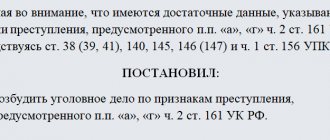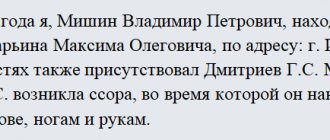1. If there is no basis for initiating a criminal case, the head of the investigative body, the investigator, the inquiry body or the inquirer shall issue a resolution to refuse to initiate a criminal case. Refusal to initiate a criminal case on the grounds provided for in paragraph 2 of part one of Article 24 of this Code is permitted only in relation to a specific person.
1.1. A decision to refuse to initiate a criminal case in connection with a reasoned decision of the prosecutor to send the relevant materials to the preliminary investigation body to resolve the issue of criminal prosecution based on violations of criminal law identified by the prosecutor, made on the basis of paragraph 2 of part two of Article 37 of this Code, may be made only with the consent of the head of the investigative body.
2. When making a decision to refuse to initiate a criminal case based on the results of checking a report of a crime related to the suspicion of its commission by a specific person or persons, the head of the investigative body, the investigator, the inquiry body are obliged to consider the issue of initiating a criminal case for knowingly false denunciation against a person who has declared or disseminated a false report of a crime.
3. Information about the refusal to initiate a criminal case based on the results of checking a report of a crime disseminated by the media is subject to mandatory publication.
4. A copy of the decision to refuse to initiate a criminal case is sent to the applicant and the prosecutor within 24 hours from the date of its issuance. At the same time, the applicant is explained his right to appeal this decision and the procedure for appealing.
5. The refusal to initiate a criminal case may be appealed to the prosecutor, the head of the investigative body or to the court in the manner established by Articles 124 and 125 of this Code.
6. Having recognized the decision of the body of inquiry, the interrogator on the refusal to initiate a criminal case as illegal or unfounded, the prosecutor cancels it and sends the corresponding resolution to the head of the body of inquiry with his instructions, setting a deadline for their execution. Having recognized the refusal of the head of the investigative body, the investigator to initiate a criminal case as illegal or unfounded, the prosecutor, no later than 5 days from the receipt of the materials for verifying the crime report, cancels the decision to refuse to initiate a criminal case, about which he issues a reasoned resolution outlining the specific circumstances subject to additional verification, which, together with the specified materials, is immediately sent to the head of the investigative body. Having recognized the refusal of the head of the investigative body, the investigator to initiate a criminal case as illegal or unfounded, the corresponding head of the investigative body cancels it and initiates a criminal case or sends materials for additional verification with his instructions, setting a deadline for their execution. 7. Having recognized the refusal to initiate a criminal case as illegal or unfounded, the judge makes a corresponding decision, sends it for execution to the head of the investigative body or the head of the inquiry body and notifies the applicant about this.
To whom are copies of the resolution sent?
The results of the preliminary investigation are available for review to all interested participants (COP Post No. 13-P dated April 29, 1998). Therefore, a notice of refusal to initiate criminal proceedings is sent:
- To the victim, even if the application was not submitted by him (Article 42 of the Code of Criminal Procedure). He is also notified of the right of appeal and its methods.
- The person against whom the applicant's charges were brought.
- The perpetrator of the committed act (in this case, reclassified as an administrative violation), who may also be the object of the statement.
- To the prosecutor, if the investigation was carried out on his initiative.
- To the tax office or insurance company that sent materials to open proceedings on the basis of Art. 198–199.4 CC.
- To the media for publication if information about the crime under investigation has also been the subject of public attention.
Copies of the refusal decision must be sent within 24 hours from the date of its adoption.
No composition
The absence of a crime means that all the elements of a criminal act are not available to bring a citizen to justice. For example, he had not reached the minimum required age or his mental state did not allow him to recognize the danger of his offense.
Part 1 art. 148 of the Code of Criminal Procedure of the Russian Federation allows the application of this provision when considering an application against a specific person. If an application is submitted without naming a specific person, the reference is unacceptable.
Where can I file a complaint about a refusal?
Investigative bodies do not have the right to cancel a refusal. An unlawful decision not to initiate a criminal case can be appealed:
- To the senior management of the investigative department. Having become convinced of the legitimacy of the complaint, the chief cancels the refusal decision and:
- personally opens production;
- initiates an additional check.
- The prosecutor, who is not authorized to initiate a case on his own, but has the right:
- cancel the refusal order;
- within 5 days, send the appropriate instructions to the leadership of the inquiry or investigative authorities.
- In a court. If the refusal is found unfounded, the court:
- makes a decision on its cancellation and the opening of office proceedings;
- sends instructions to the head of the inquiry authorities or investigative department.
How to appeal a refusal to initiate a criminal case is established in Art. 124 and 125.
Appeal from an unauthorized person
Under almost all articles of the Criminal Code, proceedings begin with a statement from a person who somehow witnessed a crime that has been committed or is being prepared.
If we are talking about cases of private or private-public prosecution, they are initiated solely at the request of the victim.
At the same time, the law gives the head of the investigation department the right, with the consent of the prosecutor, to open proceedings in exceptional cases when the victim is unable to defend himself due to poor health, age, or dependence on the suspect.
Time limits for checking a complaint
The verification of materials relating to the cancellation of an unlawful refusal is carried out within the time frame specified by the recipient of the complaint - the head of the investigation authority, the prosecutor, the judge. The maximum duration of an inspection is not directly stipulated by law, but is limited by departmental regulations:
- Prosecutors mentioning the need to adhere to reasonable time limits.
- Investigative Committee, releasing for inspection until:
- 10 days according to Art. 144 Code of Criminal Procedure;
- 30 days at the request of the investigator, if the following is to be studied: documents;
- items;
- corpses;
- tax reporting;
- financial and economic activities.
How to file a complaint about the inaction of a criminal investigator or prosecutor - read in a separate article https://lexconsult.online/7631-obzhalovanie-nezakonnyh-deistvii-politsii-primery-situatsii-obraztsy-zhalob
Where it all begins
Art. 144-148 of the Code of Criminal Procedure of the Russian Federation describes a complex of actions of investigators and interrogators. Within the limits of competence, applications are accepted and checks are carried out on them. What does this include?
- sample collection;
- requesting materials;
- appointment of examination;
- examination of the expert's opinion.
Employees of operational units are actively involved.
The law distributes categories of criminal cases between the investigative services of different bodies: the Ministry of Internal Affairs, the Investigative Committee and the FSB.
If an application with materials reaches a body that does not investigate cases under the relevant articles of the Criminal Code, measures are taken to transfer all materials to the competent structure.
Of course, police officers and other law enforcement officers refuse to accept statements under “other people’s” articles, but they are obliged to do so and take measures to preserve the scene and traces of the crime. This can be seen from the joint consideration of Art. 145 and 148 of the Code of Criminal Procedure of the Russian Federation.
Reluctance to do someone else's work manifests itself even when citizens make mistakes with territorial jurisdiction. For example, the application must be taken to a neighboring department or department.
Legal grounds for refusal
The circumstances that make it possible to refuse to initiate a criminal case or to terminate already opened proceedings are listed in Art. 24 Code of Criminal Procedure:
- No crime took place.
- The violation does not contain a crime.
- The statute of limitations for opening a case has expired.
- The death of the suspect (accused) occurred.
- The victim did not file a statement.
- There is no court opinion.
The presence of these reasons requires documentary confirmation.
An example of how grounds for refusal may be illegal is in the video below:
No illegal act
Information about the commission of a criminal act may be erroneous and caused by the applicant’s lack of awareness. For example, if a large sum of money disappears, family members may suspect theft, when in fact the owner of the funds lent it to a friend without notifying loved ones.
Also, the investigator’s refusal to initiate a criminal case may be explained by doubts regarding the guilt of the suspect, which are interpreted in his favor. This equates an unidentified event with a non-existent one.
Lack of crime
A violator cannot be held criminally liable if at least one of the elements included in a specific crime is missing (or not established). For example, the actions of the perpetrator:
note
A criminal case may be initiated for non-payment of alimony if facts of malicious evasion from paying contributions are recognized. These include: deliberate dismissal from work, concealment of real income, change of residence. You can find out more details in this article.
- Justified by the extreme circumstances mentioned in the Criminal Code, and were committed: for the purpose of self-defense;
- when detaining the culprit;
- under duress;
- for other reasons.
When issuing a refusal order, it is necessary to mention exactly what crime it is. Also, the fact of the absence of a crime must be established in relation to a certain person (Article 148 of the Code of Criminal Procedure), the identification of which is the responsibility of the employees of the investigative department. In some cases, this requirement is practically impossible to fulfill and makes little sense from a logical point of view. For example, when the insignificance of the act is clear even without identifying the perpetrator.
The absence of signs of a criminal act does not mean complete release of the perpetrator from punishment. He may be brought to administrative or civil liability.
For example, a driver hit a pedestrian, which led to the latter’s death. It was not possible to establish the presence of the subjective side of the crime, since it was not clear whether the driver had the opportunity to prevent the accident. These will be the reasons for refusing to initiate a criminal case. However, a claim for compensation for property and moral damage may be brought against the perpetrator.
Lapse of time
The calculation of the statute of limitations for criminal prosecution is carried out in accordance with Art. 78 of the Criminal Code. Their course begins from the moment the unlawful act is committed and ends on the day when the sentence takes legal force. If the convicted person commits a crime again, the statute of limitations will be calculated separately.
Read more about the statute of limitations for criminal prosecution here https://lexconsult.online/8810-sroki-davnosti-po-privlecheniyu-k-ugolovnoi-otvetstvennosti
The countdown may be suspended when the accused cannot be brought to participate in the investigative procedure and court hearing due to the unknown of his whereabouts. If the culprit is detained or appears voluntarily, the deadline continues to expire. A criminal case cannot be initiated if the limitation period is:
- was not violated by a new crime;
- ended due to reasons beyond the suspect’s control.
If the statute of limitations for an act punishable by death has expired, the application of this fact is left to the discretion of the court. If the decision is positive, the extreme measure may be replaced by serving a sentence. Such precedents require the mandatory opening of production.
Death of the person accused by the applicant
The case cannot be initiated if the person against whom the complaint was made has died or there was strong suspicion of involvement. The exception is cases where the investigation is necessary for the rehabilitation of the deceased. If the investigative authorities do not want to initiate criminal proceedings, relatives can appeal their decision. In this case, the investigation is carried out according to the usual pattern and ends with a trial in absentia.
Lack of statement from the victim
Slandered? Answer
For slander and dissemination of false information, you can sue the offender. If he is known (for example, a neighbor), a lawsuit for libel can be filed in the magistrate's court. But if a stranger inflicted a slanderous insult, then you should contact law enforcement agencies, who will be tasked with identifying the offender and finding him.
If the initiation of a case is, in principle, possible only at the request of the victim, the absence of such will serve as sufficient grounds for refusal. Cases requiring a mandatory application are mentioned in Art. 20 of the Code of Criminal Procedure and relate to the following criminal acts:
- slander;
- beatings;
- causing minor physical harm;
- others.
This rule does not apply to a victim who is unable to defend his rights and interests due to dependence, helplessness of his own position or other reasons.
General concept
Art. 148 of the Code of Criminal Procedure of the Russian Federation describes the actions of participants in criminal proceedings when a decision is made to abandon criminal prosecution.
Refusal represents the completion of an entire stage of the criminal process, starting from the acceptance of documents from the applicant and ending with the adoption of a negative or positive decision.
The actions of law enforcement agencies at this stage are carried out outside the framework of the criminal case, and the powers of the inspectors are not sufficiently defined.
Art. 148 of the Code of Criminal Procedure regulates the processing of the results of verification of a criminal complaint.
Application of ORD results
Operational-search activities are the public and secret activities of operational services aimed at identifying or solving crimes.
The work performed by operational services has its own specifics. At the same time, the evidence obtained by them can be used in criminal proceedings, subject to compliance with procedural guarantees. For example, entry into a home was carried out by court order, monitoring and recording of telephone conversations were also carried out with the permission of the court.
This is directly referenced in the Law “On Operational-Investigative Activities”.
If there have been violations, it is considered that the evidence was obtained illegally, in addition, criminal cases may be brought against employees.
The materials of the operational investigation are added to the materials of the inspection based on the report of the employees of the relevant service.
The investigator or inquiry officer attaches the materials of the operational investigation by his/her resolution, after which the applicant and his representative and other participants in the case are provided with access to them in accordance with the norms of the Code of Criminal Procedure.






